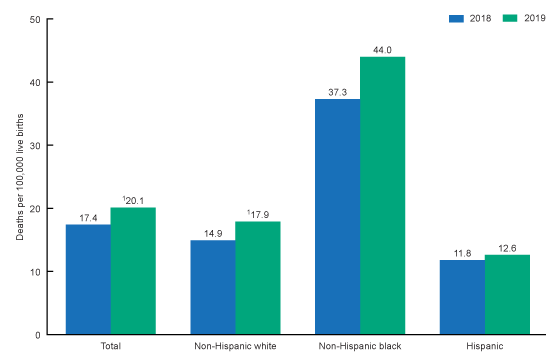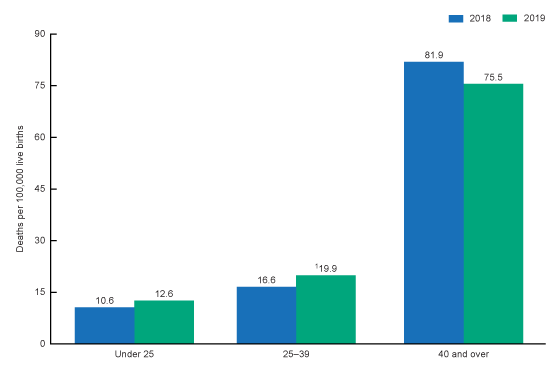Maternal Mortality Rates in the United States, 2019
by Donna L. Hoyert, Ph.D., Division of Vital Statistics
This report presents maternal mortality rates for 2019 based on data from the National Vital Statistics System. A maternal death is defined by the World Health Organization as, “the death of a woman while pregnant or within 42 days of termination of pregnancy, irrespective of the duration and the site of the pregnancy, from any cause related to or aggravated by the pregnancy or its management, but not from accidental or incidental causes (1).” Maternal mortality rates, which are the number of maternal deaths per 100,000 live births, are shown in this report by age group and race and Hispanic origin.
In 2019, 754 women were identified as having died of maternal causes in the United States, compared with 658 in 2018 (2). The maternal mortality rate for 2019 (20.1 deaths per 100,000 live births) was significantly higher than the rate for 2018 (17.4) (Table).
In 2019, the maternal mortality rate for non-Hispanic black women was 44.0 deaths per 100,000 live births, 2.5 times the rate for non-Hispanic white women (17.9) and 3.5 times the rate for Hispanic women (12.6) (Figure 1 and Table). Rates for non-Hispanic black women were significantly higher than rates for non-Hispanic white and Hispanic women. The increase in the maternal mortality rate from 2018 (14.9) to 2019 for non-Hispanic white women was statistically significant. The observed increases from 2018 to 2019 for non-Hispanic black women and Hispanic women were not significant.
Rates increased with maternal age, with rates in 2019 of 12.6 deaths per 100,000 live births for women under age 25, 19.9 for those aged 25–39, and 75.5 for those aged 40 and over (Figure 2 and Table). The rate for women aged 40 and over was 6.0 times higher than the rate for women under age 25. Differences in the rates between age groups were statistically significant. Among age groups, only the increase in the rate between 2018 (16.6) and 2019 for women aged 25–39 was significant.
Data source and methods
Data are from the National Vital Statistics System mortality file (3). Consistent with previous reports, the number of maternal deaths does not include all deaths occurring to pregnant or recently pregnant women, but only those deaths with the underlying cause of death assigned to International Statistical Classification of Diseases, 10th Revision (ICD–10) code numbers A34, O00–O95, and O98–O99. Maternal mortality rates are per 100,000 live births based on data from the National Vital Statistics System natality file. Maternal mortality rates fluctuate from year to year because of the relatively small number of these events, and possibly also due to issues associated with the reporting of maternal deaths on death certificates (2). Efforts to improve data quality are continuing and these data will continue to be evaluated for possible errors.
References
- World Health Organization. International statistical classification of diseases and related health problems, 10th revision. 2008 ed. Geneva, Switzerland. 2009.
- Hoyert DL, Minino AM. Maternal mortality in the United States: Changes in coding, publication, and data release, 2018. National Vital Statistics Reports; vol 69 no 2. Hyattsville, MD: National Center for Health Statistics. 2020.
- Kochanek KD, Xu JQ, Arias E. Mortality in the United States, 2019. NCHS Data Brief, no 395. Hyattsville, MD: National Center for Health Statistics. 2020.
Acknowledgments
This author would like to acknowledge the computing assistance of Arialdi Miniño.
Suggested citation
Hoyert DL. Maternal mortality rates in the United States, 2019. NCHS Health E-Stats. 2021. DOI: https://doi.org/10.15620/cdc:103855.
Table
Table 1. Number of maternal deaths and maternal mortality rates, by race and Hispanic origin and age: United States, 2018 and 2019
| Race and Hispanic origin and age |
2018 | 2019 | ||
|---|---|---|---|---|
| Number of deaths | Maternal mortality rate1 | Number of deaths | Maternal mortality rate1 | |
| 658 | 17.4 | 754 | 20.1 | |
| Under 25 | 96 | 10.6 | 111 | 12.6 |
| 25–39 | 458 | 16.6 | 544 | 19.9 |
| 40 and over | 104 | 81.9 | 98 | 75.5 |
| Non-Hispanic white3 | 291 | 14.9 | 343 | 17.9 |
| Under 25 | 41 | 10.5 | 49 | 13.1 |
| 25–39 | 207 | 13.8 | 248 | 16.8 |
| 40 and over | 43 | 72.0 | 46 | 75.2 |
| Non-Hispanic black3 | 206 | 37.3 | 241 | 44.0 |
| 27 | 15.3 | 32 | 18.8 | |
| 25–39 | 137 | 38.2 | 179 | 49.7 |
| 40 and over | 42 | 239.9 | 30 | 166.5 |
| Hispanic | 105 | 11.8 | 112 | 12.6 |
| Under 25 | 21 | 7.6 | 23 | 8.5 |
| 25–39 | 72 | 12.4 | 71 | 12.2 |
| 40 and over | 12 | * | 18 | * |
* Rate does not meet National Center for Health Statistics standards of reliability.
1Maternal mortality rates are deaths per 100,000 live births.
2Total includes deaths for race and origin groups not shown separately, including deaths among multiple-race women and deaths with origin not stated. Race groups are single race.
3Race groups are single race.
NOTES: Maternal causes are those assigned to categories A34, O00–O95, and O98–O99 of the International Classification of Diseases,10th Revision, 1992. Maternal deaths occur while pregnant or within 42 days of being pregnant.
SOURCE: National Center for Health Statistics, National Vital Statistics System, Mortality

